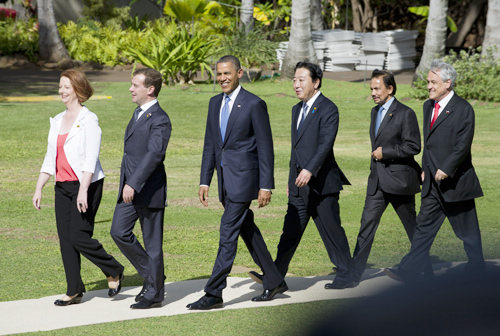Back in town
- By Wu Chunsi
 0 Comment(s)
0 Comment(s) Print
Print E-mail
Beijing Review, January 9, 2012
E-mail
Beijing Review, January 9, 2012
|
|
|
Marching in: U.S. President Barack Obama with other Asia-Pacific leaders at the 19th APEC Summit in Honolulu, Hawaii, on November 13, 2011 [Zhang Jun] |
The United States has shifted its focus to the Asia-Pacific. This momentous move has sparked a heated debate in the Chinese media and academic community on a number of critical issues: Is the Obama administration's new Asia-Pacific strategy in opposition to China? What will be the implications of this strategy? And how will China and the United States interact with each other in the Asia-Pacific region?
New strategy
After a decade focused on events in the Middle East, the United States has recently bolstered its presence in the Asia-Pacific, though many U.S. scholars argue the United States has never left the region.
During a meeting with foreign ministers from the Association of Southeast Asian Nations (ASEAN) in July 2009 in Phuket, Thailand, U.S. Secretary of State Hillary Clinton said, "The United States is back in Southeast Asia and we are fully engaged with our ASEAN partners on the wide range of challenges confronting us, from regional and global security to the economic crisis to human rights and climate change."
In November 2011, Clinton published a lengthy piece in the Foreign Policy magazine, in which she once again laid out the terms of what she called "America's Pacific century," making it clear that the United States will shift its strategic focus to the Asia-Pacific. And almost at the same time, at the APEC Summit in Honolulu, U.S. President Barack Obama also sent a strong message that America is back. "The United States is a Pacific power and we're here to stay," he said.
The United States has kept a presence in the Asia-Pacific since the Spanish-American War in 1898. But that doesn't mean it plays a prominent role in the region or the region holds a prominent position in U.S. foreign policy. Since the beginning of the 21st century, the United States has been preoccupied with antiterrorism and Middle East affairs. As a result, its presence in the Asia-Pacific region was dramatically reduced during George W. Bush's presidency.
Multiple reasons
Obama's childhood experience of life in Indonesia might endow the president some special regard for the Asia-Pacific region. But the heavy reliance of the United States on the Asia-Pacific region for economic growth is the primary cause of its "return."







Go to Forum >>0 Comment(s)